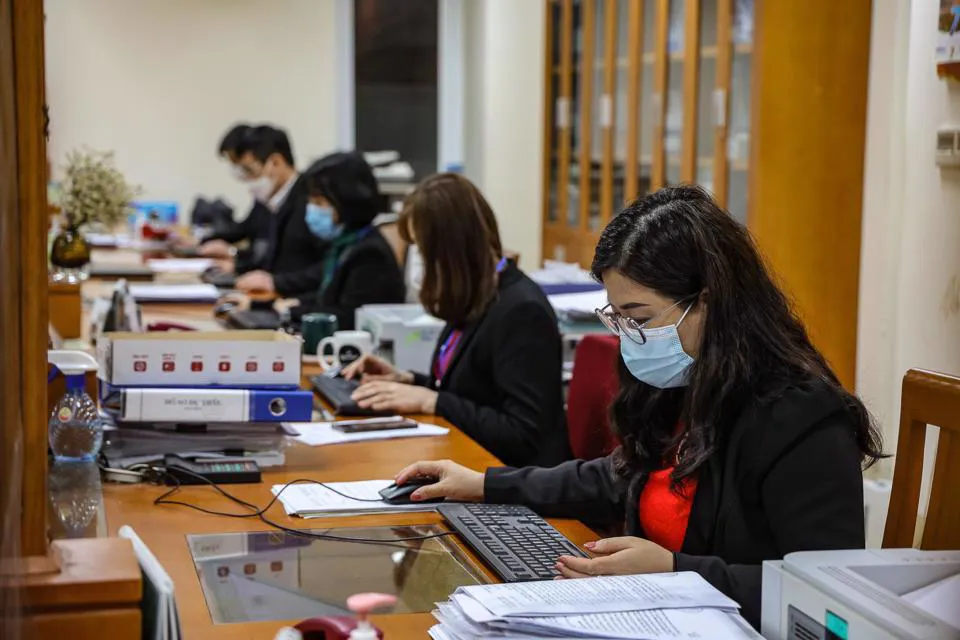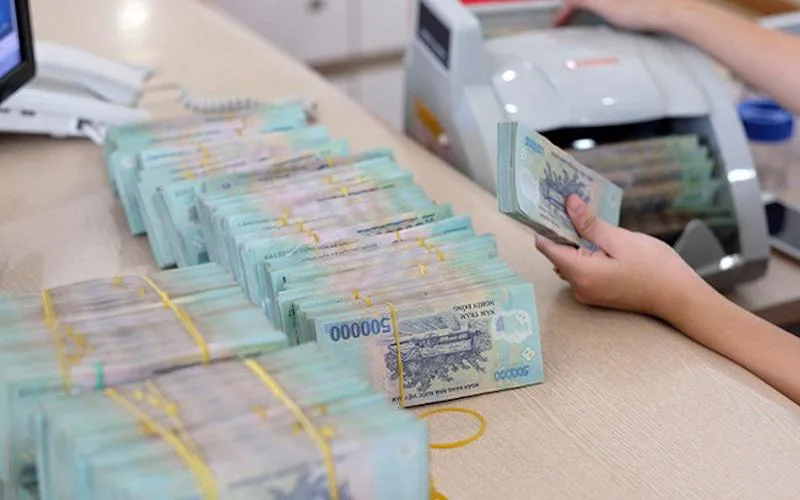US$2.4 billion ready for nationwide salary raise
A move to increase the base salary for civil servants is necessary to raise the standard of living conditions for Vietnamese people.
The Government is ready to raise a nationwide base salary for which some VND60 trillion (US$2.4 billion) has been set aside, Deputy Minister of Finance Nguyen Duc Chi told a press conference on October 29.
| Administrative staff work at Hanoi's Hoan Kiem District office. Photo: The Hanoi Times |
The nationwide base salary raise complies with Resolution 27/NQ-TW issued in May 2018 to guarantee decent incomes for workers, motivate them to increase labor productivity, and boost the country's sustainable socioeconomic growth.
As Vietnam has undergone a rough three-year time under the severe impacts of the Covid-19 pandemic and the volatility of the global economy, people need a salary raise to secure their living conditions.
The government has instructed the Ministry of Finance, other ministries, and local authorities to increase budget revenues and save public expenditures to prepare a sufficient fund for the wage hike, Chi said.
By the end of 2021, the provincial authorities had saved VND290 billion for the wage increase, while the state budget had some 43 billion VND set aside, the deputy minister said.
The Finance Ministry expects the nationwide wage increase to require financing of some 60 billion VND, and given the preparation of local and central authorities, the increase will take effect once it is approved, he said.
The Ministry of Finance recently submitted its base salary increase plan for consideration by the National Assembly.
Accordingly, the basic salary for civil servants, which will increase to VND1.8 million per month from the current VND1.49 million, will be adequate on July 1, 2023, upon approval.
However, some delegates suggested that the Government increase the base salary from January 1, 2023, instead of July 1, 2023, as proposed.
In their response, the Ministries of Finance and Interior said that if the wage increase begins in early 2023, it will be difficult for the government to control inflation.
Proper monetary move
The recent interest rates increase by the State Bank of Vietnam (SBV), and commercial banks will guarantee stable macroeconomic conditions, SBV deputy governor Pham Thanh Ha said on October 29.
He said the rate hike would also ensure liquidity for banks and the economy in response to media questions about the SBV's monetary policy.
Higher interest rates will ensure the financial security of banks and redirect the flow of capital to the economy healthier, he said.
To handle pressure from the global financial markets, ensure sufficient capital and liquidity for credit institutions, and finance business activities, the State Bank of Vietnam has made several rate hikes, with the latest move on October 24.
Ha said the rate hikes would enable banks to raise more capital, secure their liquidity, and finance economic and business activities better.
“Increased lending rates also suit the latest developments of the global financial markets where the US and other central banks have done so amid a prolonged inflation situation and a stronger US dollar,” the deputy governor said.
Deputy Governor Ha said the State Bank of Vietnam always wants loans channeled to priority sectors regarding enterprises' access to bank loans.
"We have a limit for preferential loans for the five sectors that will enjoy various incentives from the Government. Qualified enterprises can access loans with interest rates far below market rates," he said.
The five prioritized sectors are exports, agriculture and rural development, small- and medium-sized enterprises, auxiliary industry, and high-tech enterprises.
Vietnam's socio-economic progress in 10 months Vietnam has seen its socioeconomic recovery continue in October and the ten months of 2022. The Covid-19 pandemic remained under control, with the number of infections and casualties declining strongly. The ratio of dead Covid-19 patients is 0.38%, much lower than the world’s average of 1.04%. Macroeconomic conditions and inflation have been under control, with the 10-month average of the consumer price index (CPI) standing at 2.89%, helping to facilitate the country's socioeconomic growth. The State budget revenue in 10 months was estimated to increase by 16.2% year-on-year and beat the target by 3.7%. Import-export turnover was worth $616 billion, up 14.1% on-year. The export surplus reached $9.4 billion, and food and energy supplies were at certain levels. Realized foreign direct investment (FDI) capital in 10 months rose 15.2% on-year to $17.45 billion. The numbers of newly-registered and re-activated businesses in 10 months were up 38.3% on-year to some 178,500. In addition, nearly VND66.3 trillion has been disbursed to assist the country’s socio-economic activities. |












